Which AI tools are leading in product management? 2025 Top 5.
Explore the top AI tools revolutionizing product management in 2025, enhancing workflows, decision-making, and team efficiency.
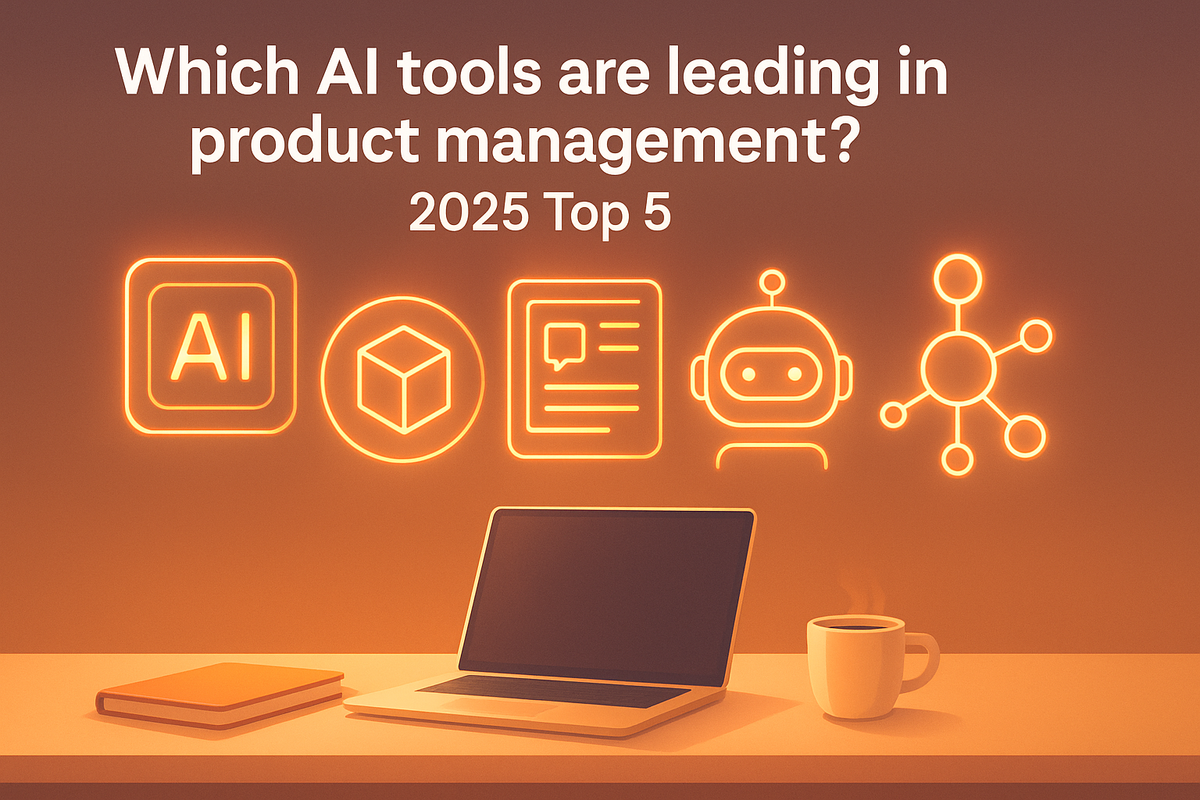
AI tools are transforming product management in 2025 by saving time, improving decision-making, and automating workflows. Here are the top 5 tools you need to know about:
- BuildBetter.ai: Converts unstructured data into insights, saving 18 hours per sprint and reducing 26 meetings per month. It integrates with over 100 tools like Slack and Jira.
- Jira Align AI: Links strategy to execution, enabling real-time decision-making and reducing project completion time by 20%.
- ProductBoard AI: Processes customer feedback in multiple languages, improving feature linking by 30% and speeding up feedback analysis.
- Aha! Roadmaps AI: Simplifies strategic planning and generates AI-powered release notes for better communication.
- Monday.com AI: Automates workflows with "AI Blocks" and provides tools like risk analysis and bug categorization.
Quick Comparison
| Tool | Key Features | Time Savings/Impact | Pricing (Monthly) |
|---|---|---|---|
| BuildBetter.ai | Data insights, workflow automation | Saves 18 hours/sprint, 43% more revenue tasks | Starts at $7.99 |
| Jira Align AI | Real-time tracking, strategic alignment | 20% faster project completion | Custom |
| ProductBoard AI | Feedback analysis, multilingual support | 30% better feature linking | Paid add-on |
| Aha! Roadmaps AI | AI release notes, strategic planning | Simplifies updates, enhances visibility | Custom |
| Monday.com AI | Workflow automation, risk analysis | Improves operations, 346% ROI reported | Custom |
These tools are reshaping product management, making teams more efficient and data-driven. Choose the one that fits your needs best!
5 Powerful AI Tools Every Product Manager Should Be Using
1. BuildBetter.ai
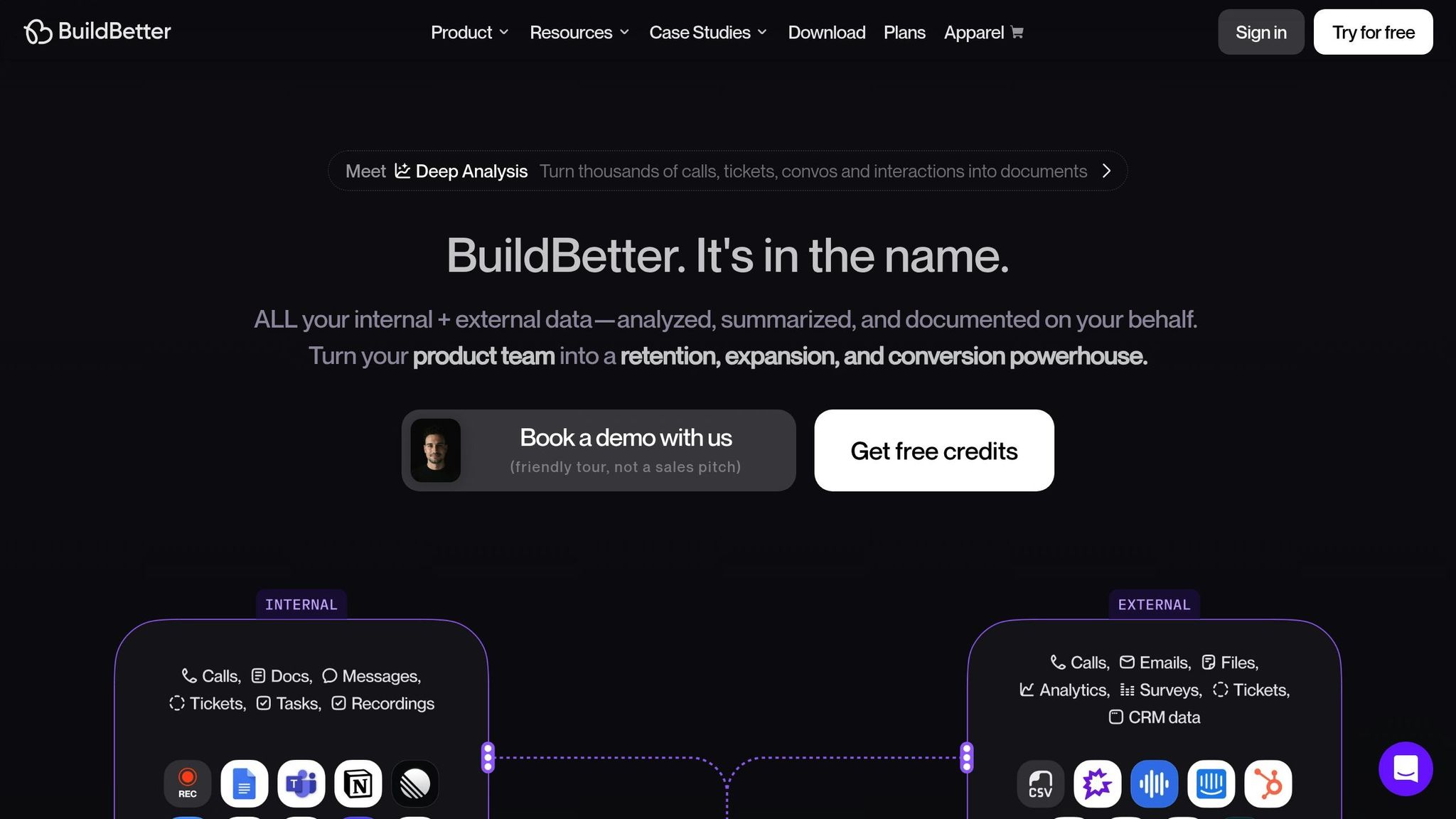
BuildBetter.ai is an AI-powered insights platform designed for B2B teams, focusing on turning unstructured data into actionable insights that inform better product decisions.
Product teams using BuildBetter.ai report spending 43% more time on revenue-generating tasks, saving an average of 18 hours per two-week sprint. This translates to approximately $21,000 in annual savings. These impressive results are driven by three main features:
- Signals: This feature transforms interactions into actionable insights. Teams cut the time between gathering customer insights and taking action by 50%, enabling quicker, data-driven decisions.
- Workflows: Automating workflows eliminates 26 meetings per month, reduces operational work by 40%, and accelerates decision-making by 30%.
- Reports + Documents: The platform generates detailed, cited reports from multiple data sources and integrates seamlessly with tools like communication platforms, project management software, customer service systems, and CRMs.
Leaders such as John Strang and Product Lead Aditya Goyal praise the platform's impact:
"It wouldn't be possible to do my job at this scale without BuildBetter", highlighting its role in streamlining operations.
BuildBetter.ai prioritizes data security and privacy, adhering to GDPR, HIPAA, and SOC 2 Type 2 standards. Importantly, it does not use customer data to train its AI models, ensuring strict confidentiality.
| Feature Category | Impact Metrics |
|---|---|
| Time Savings | 18 hours saved per sprint |
| Meeting Reduction | 26 fewer meetings per month |
| Decision Making | 30% faster decision-making |
| Revenue Activities | 43% increase in revenue-focused tasks |
| Customer Insights | 50% faster insight-to-action process |
AI Director Seamus Smyth commends the platform's performance:
"Congratulations on rolling out an AI product that actually works."
With a 98% subscription retention rate, BuildBetter.ai has proven itself as an essential tool for modern product management teams.
2. Jira Align AI
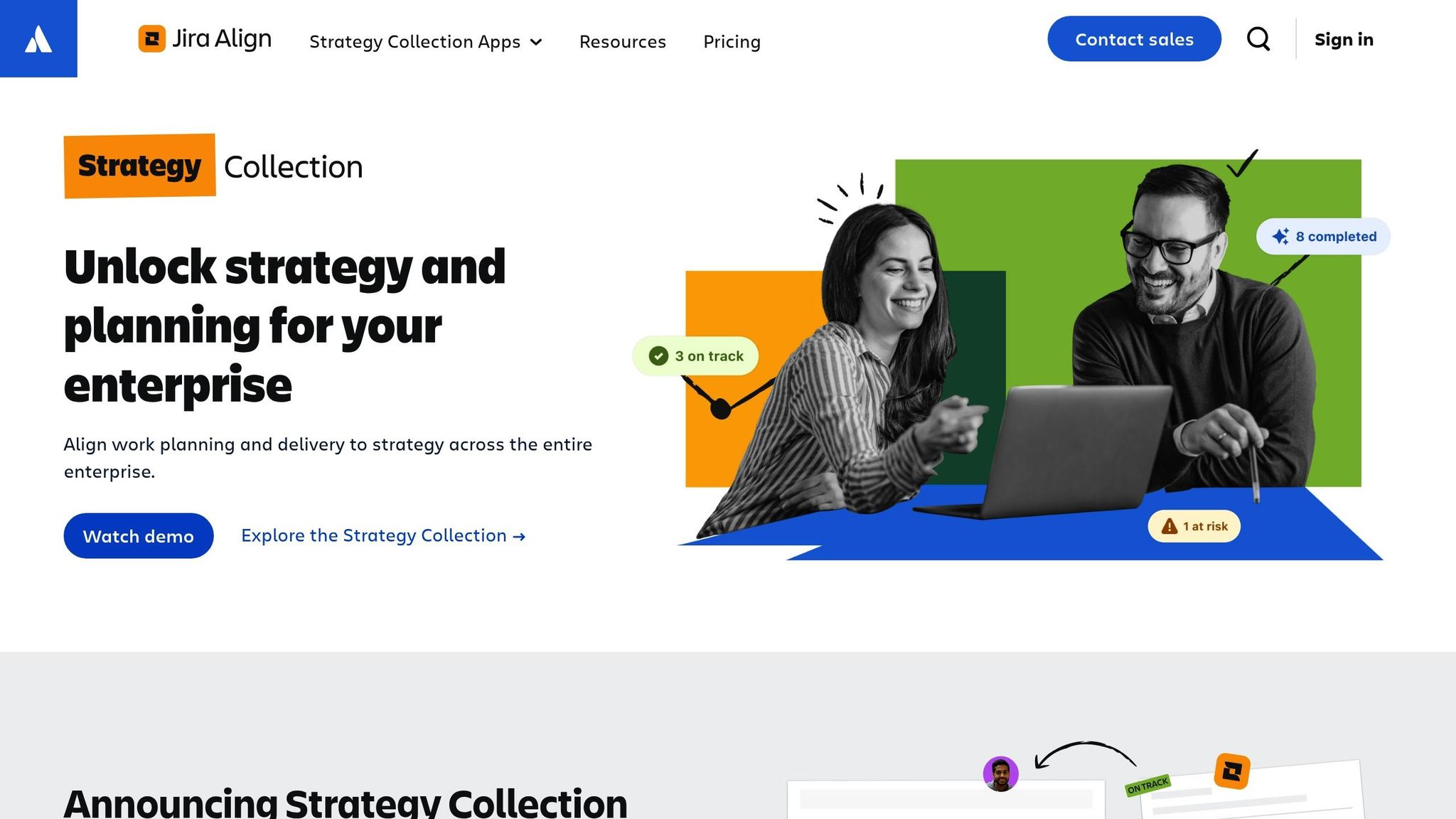
Jira Align AI bridges the gap between strategy and execution, improving teamwork and simplifying product workflows. As the leading Agile tool for project management, it reshapes how organizations handle product development. Its capabilities focus on three key areas to boost efficiency: real-time decision-making, strategic alignment, and cross-team collaboration.
Real-Time Visibility and Decision Support
Jira Align AI offers a clear view across work streams, allowing teams to identify and fix blockers instantly. By tracking progress in real-time, it helps teams stay on track and pivot when necessary.
Strategic Alignment
The platform connects investments directly to customer value, assisting product managers in making informed decisions about priorities and resource allocation.
Its impact is backed by results: In March 2025, a global financial services firm using Jira Align AI reported a 20% faster project completion rate, a 15% drop in budget overruns, and better communication and dependency management.
Cross-Team Collaboration
Jira Align AI simplifies collaboration across distributed teams. It uses AI to automatically document requirements with added context, helping engineers in different time zones stay aligned without endless meetings.
Martin Brignall, Developer Tooling Specialist at OVO, shared his experience:
"Atlassian Intelligence has helped bring our DevOps practices into Slack to reduce context-switching. Alongside AI answers and issue summaries, harnessing Atlassian Intelligence has led to a boost in our developer experience."
Key Features and Their Impact
| Feature | Impact |
|---|---|
| Real-Time Monitoring | Quickly identifies and resolves blockers |
| Strategic Alignment | Links investments to clear customer value |
| Integration Capabilities | Works seamlessly with Jira and Azure DevOps |
| AI-Powered Documentation | Automates context-rich requirement documentation |
Jira Align AI supports various frameworks like SAFe, Scrum@Scale, and hybrid models, offering flexibility while maintaining high productivity.
3. ProductBoard AI
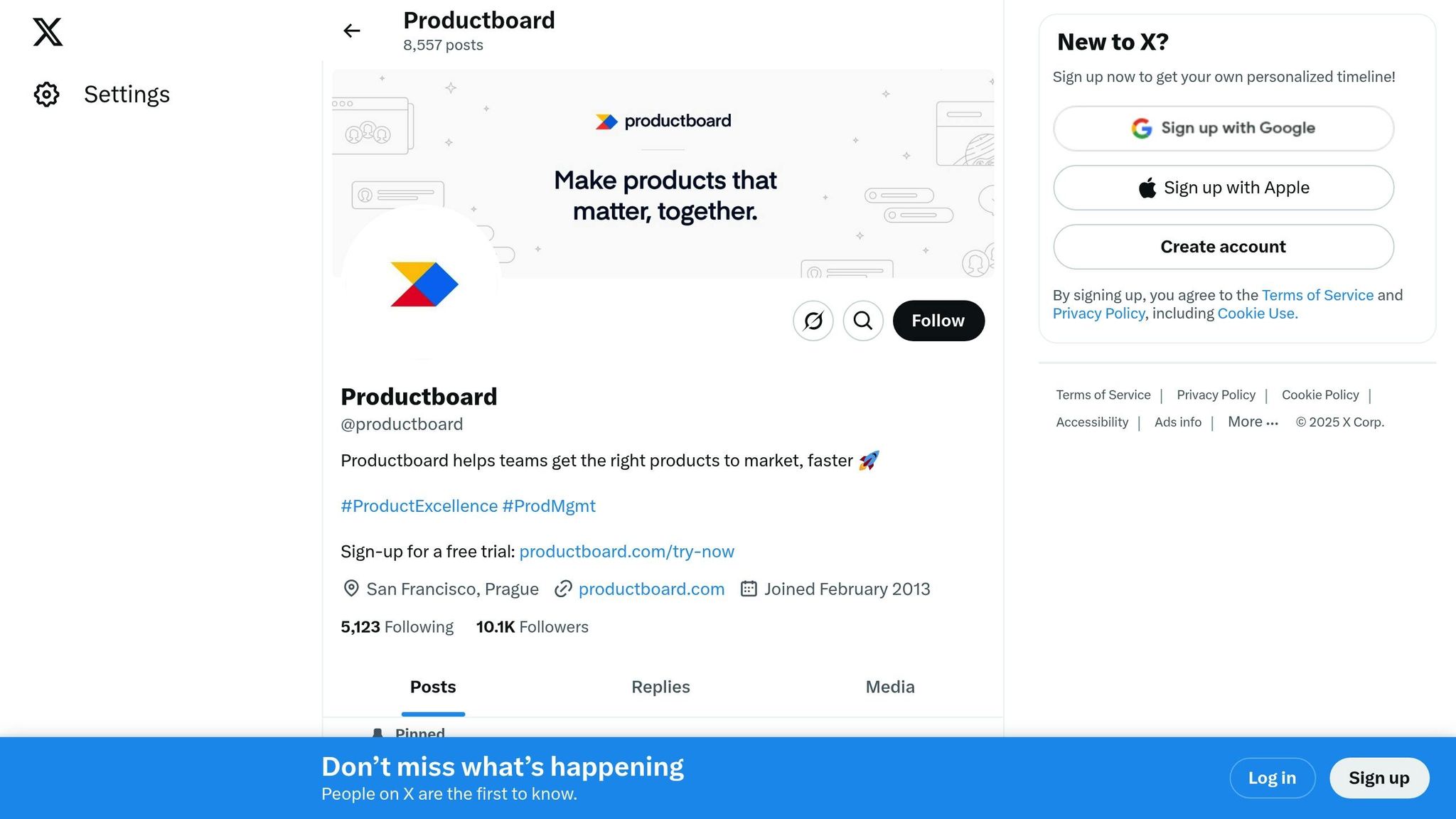
ProductBoard AI transforms how teams handle customer feedback. It focuses on three main areas: analyzing feedback, developing features, and supporting multiple languages.
Intelligent Feedback Processing
Dashlane improved its feedback processing rate from 50% to over 80% and boosted feature linking by 30% with ProductBoard AI.
Key features include:
| Feature | Function | Impact |
|---|---|---|
| AI Summaries | Extracts key insights from conversations | Processes hundreds of notes instantly |
| Auto-linking | Connects feedback to feature ideas | 30% improvement in linking features |
| AI Topics | Identifies patterns in feedback | Automates theme detection |
| AI Search | Finds related customer feedback | Speeds up opportunity validation |
These tools don't just uncover insights - they also make feature development more efficient.
Smart Feature Development
ProductBoard AI simplifies feature development by creating AI-generated specifications based on customer feedback. Kraig Clark, VP of Product at Arena (PTC), shared:
"We've fallen in love with Productboard's AI capabilities, which are incredibly useful for identifying and summarizing feature-related insights, saving our team countless hours of manual work. Productboard has been one of the best software investments we've made, as it helps to align the needs of our customer-facing teams with the features we are planning for and building."
The platform also breaks down language barriers to ensure feedback from diverse users is actionable.
Multilingual Capabilities
Felipe Mury Botelho, Lead Product Operations at Zenchef, explained:
"Productboard AI has allowed us to collect, triage, and make decisions based on feedback from hundreds of restaurants across six countries and in eight different languages. It doesn't matter how many languages my PMs speak; with Productboard, all feedback is valid and quickly digested."
Practical Benefits in Action
Companies like ToolTime maintain high-quality insights despite rapid user growth. Meanwhile, SmartDok uses ProductBoard AI to streamline feature evaluation, enabling product teams to process feedback more effectively.
This tool is available as a paid add-on for Pro, Scale, and Enterprise plans, leveraging OpenAI's technology for dependable performance. These examples highlight how ProductBoard AI is reshaping product management workflows.
4. Aha! Roadmaps AI
Aha! Roadmaps AI brings strategic planning and execution into one place, helping teams stay aligned and work more efficiently.
Strategic Planning and Execution
This platform bridges the gap between big-picture strategy and day-to-day tasks. Michael Morris, Director of Global Product Management at Experian, highlights its value:
"Aha! provides a complete picture across our entire portfolio. We can quickly access product information at any level and see how it ties to the overall strategy."
With integrations for over 30 development tools and 75+ pre-built product reports, teams can maintain alignment and visibility across projects.
AI-Powered Release Management
The AI-driven release notes generator simplifies how updates are communicated. It automatically analyzes features, organizes updates, and creates concise benefit summaries for easy sharing across channels.
| Capability | Function | Impact |
|---|---|---|
| Feature Analysis | Automatically reviews completed features | Saves time on documentation |
| Smart Grouping | Sorts updates by feature type | Makes updates easier to follow |
| Benefit Summary | Crafts clear, concise benefit descriptions | Improves user understanding |
| Multi-Channel Publishing | Publishes updates as a webpage or portal | Expands accessibility |
Real-World Implementation Success
The platform’s impact is evident in product operations. Jerimiah Rudden, Senior Manager of Product Strategy and Operations at Genesys, shares:
"Implementing Aha! software has been a sea change for our team. We are now more focused than ever on delivering product value - for our customers and the business."
Advanced Reporting Capabilities
Aha! Roadmaps AI provides detailed reporting tools to track progress with precision:
| Feature | Specification | Benefit |
|---|---|---|
| Data Fields | 200+ customizable options | Tracks all relevant details |
| Report Templates | 75+ pre-built templates | Speeds up setup |
| Real-time Updates | Automatic data synchronization | Keeps insights up to date |
These features enable teams to monitor projects efficiently and make better decisions.
Best Practices for Implementation
To get the most out of AI-generated release notes, teams should:
- Keep Documentation Updated: Ensure feature descriptions are current throughout development.
- Leverage Custom Fields: Use predefined choice lists for consistent release note requirements.
- Review AI Drafts: While AI speeds up drafting, human review ensures accuracy and quality.
The platform also offers flexible security settings, allowing teams to adjust AI capabilities to match their needs and comfort level.
5. Monday.com AI
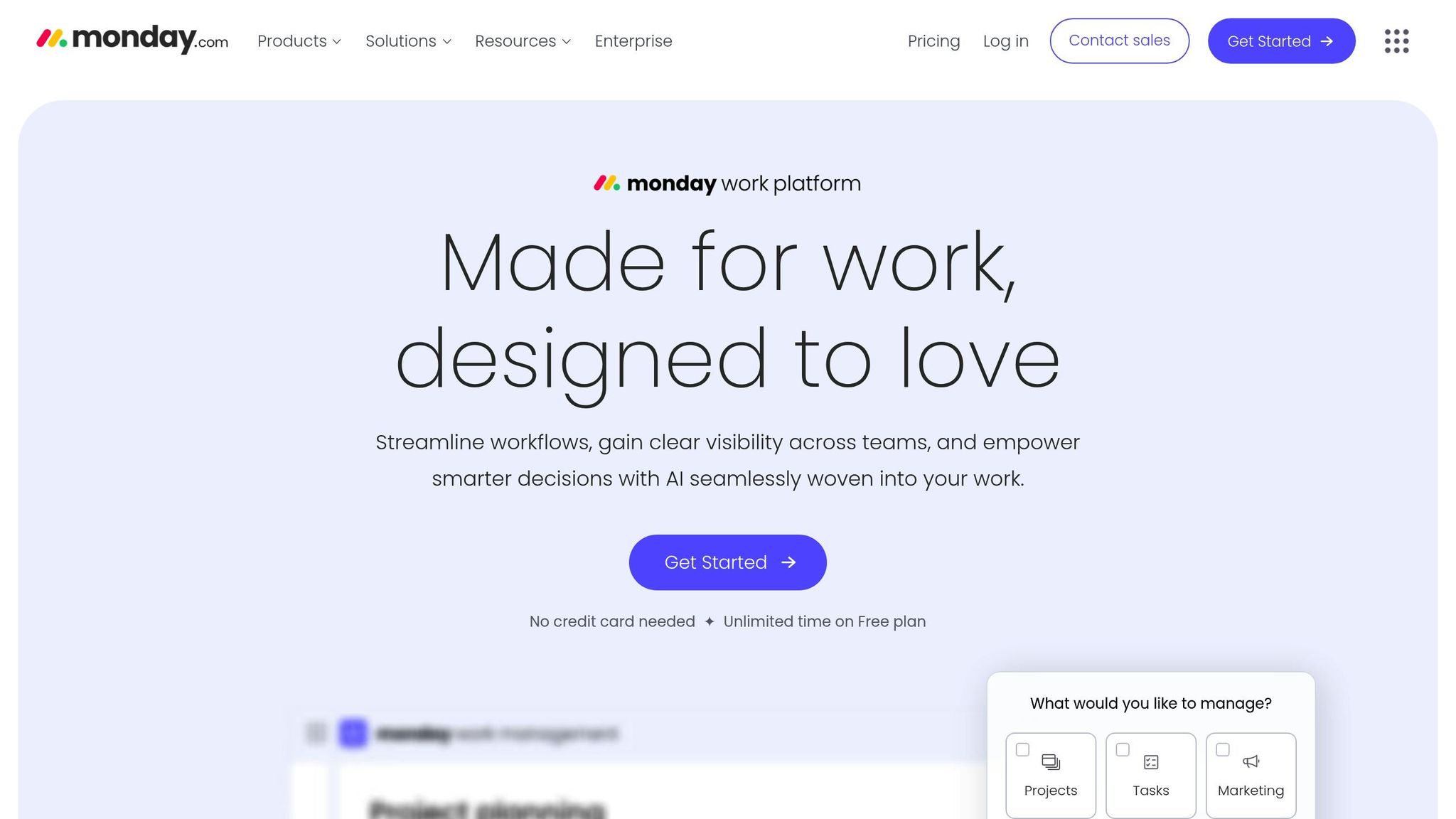
Monday.com AI brings automation to product management by embedding AI into workflow processes. Its approach simplifies operations and supports better decision-making for product teams.
AI Blocks for Workflow Automation
Monday.com's "AI Blocks" system changes how product teams handle repetitive tasks, offering tools like:
| AI Block Type | Function | Product Management Application |
|---|---|---|
| Bug Categorization | Automatically prioritizes issues | Simplifies development workflows |
| Risk Analysis | Flags potential project risks | Helps teams address challenges early |
| Field Automation | Personalizes outreach and updates | Improves communication with stakeholders |
| Smart Summaries | Creates concise project overviews | Speeds up status reporting |
| Translation | Manages multilingual content | Assists with global product launches |
In addition to automating workflows, Monday.com introduces features designed to enhance team productivity.
Digital Workforce Integration
The platform's "Digital Workforce" feature uses AI specialists to manage specific tasks. For instance, Motorola reported a 346% ROI after using this tool.
Chris Funk, Senior Director of Product Innovation at Zippo, shared:
"monday.com has enabled our group to launch more product categories and expand into more markets in way less time."
This feature goes beyond task automation by providing real-time insights that help teams make informed decisions.
Advanced Visibility and Decision Support
Monday.com AI provides a clear view of product operations. Jacob Thomas, Senior VP of Global Sourcing & Supply Chain at UMG, highlighted its impact:
"In a business that's 80% quick turnaround and 20% forecasting, monday.com has allowed us to maximize our efforts with lanes of visibility into short forecasting windows that help drive and stimulate opportunistic sales."
Keys to Implementation Success
To get the most out of Monday.com AI, product teams should:
- Start with AI Blocks: Focus on automating essential tasks first, then expand usage.
- Use the Digital Workforce: Assign AI specialists to repetitive, recurring tasks.
- Track Analytics: Measure how automation affects team efficiency and outcomes.
Vic Diesta, Creative Ops Lead at Canva, emphasized the platform's adaptability:
"The fact that we've been able to adjust and adapt monday.com to meet our needs at two different times was incredibly important to us."
Built for Enterprise Needs
Monday.com AI is designed to handle the demands of large organizations. With over 245,000 customers and 61% of Fortune 500 companies using the platform, it offers AI-powered solutions tailored for businesses of all sizes while remaining flexible enough to grow with them.
Features and Pricing Comparison
BuildBetter.ai Features and Pricing Overview - April 2025.
Core Features Comparison
| Feature Category | BuildBetter.ai |
|---|---|
| Data Analysis | Advanced customer data analysis |
| Integration Capacity | Supports over 100 integrations, including Zoom, Slack, and Jira |
| AI Capabilities | AI-powered chat and automated documentation |
| Collaboration | Enables team-wide knowledge sharing through integrated tools |
| Automation | Advanced workflow automation and smart meeting summaries |
Pricing Structure (Monthly)
| Plan Tier | Price |
|---|---|
| Starter | $7.99/month |
| Growing | $200/month |
| Scaling | $800/month |
| Enterprise | Custom pricing |
Performance metrics highlight the value BuildBetter.ai brings beyond its pricing.
Performance Metrics
BuildBetter.ai handles chat queries up to 10x faster, making it easier to manage even the most complex feedback streams.
Enterprise Readiness
- BuildBetter.ai: Fully complies with GDPR, HIPAA, and SOC 2 Type 2 standards, ensuring strong privacy and security measures for enterprise clients.
These compliance and performance features add to its overall appeal.
Cost-Value Considerations
-
Data Processing Needs
Minute-based processing rates: $0.10 for Starter, $0.08 for Growing, and $0.06 for Scaling plans. -
Team Size Impact
Unlike per-user pricing models, BuildBetter.ai includes unlimited seats in its base plans, making it a cost-effective choice for larger teams. -
Integration Requirements
With over 100 native integrations, BuildBetter.ai is designed to work seamlessly with your existing tools and systems.
"What are your customers asking for that your product team isn't working on?" - BuildBetter.ai
BuildBetter.ai combines powerful insights, seamless tool compatibility, and budget-friendly pricing, making it a strong choice for modern product management teams.
Key Takeaways
By 2025, AI tools are reshaping product management, driving efficiency and improving decision-making. Teams leveraging these solutions report better productivity, with noticeable gains in revenue-generating activities, time management, and streamlined workflows.
AI tools deliver measurable results, including a 43% increase in revenue-focused activities, saving 18 hours per sprint, and reducing 26 meetings per month. These advancements fall into three main areas:
1. Data Unification and Analysis
Product teams handle massive amounts of unstructured data from sources like customer feedback, internal chats, and support tickets. With recent AI advancements, response times are now up to 10x faster.
2. Workflow Optimization
AI tools are transforming traditional processes by automating tasks and managing documentation. This shift has significantly reduced administrative burdens, allowing teams to dedicate more time to strategic priorities.
3. Strategic Decision-Making
Advanced AI systems enhance product decisions by leveraging natural language processing and pattern recognition. These tools have moved beyond experimental stages to deliver real business impact.
For teams exploring AI adoption, success hinges on tools that provide:
- Seamless data integration across multiple sources
- Strong privacy protections (e.g., GDPR, HIPAA, SOC 2 Type 2 compliance)
- Scalable automation to handle growing workloads
- Actionable insights from both internal and external data
As highlighted in the tool reviews, AI's role in product management is undeniable. Seamus Smyth, an AI Director, encapsulates this shift perfectly:
"Congratulations on rolling out an AI product that actually works."
The maturity of these tools shows how essential AI has become in modern product management, where data-driven decisions and efficiency are key to success.
FAQs
How does BuildBetter.ai enhance decision-making for product managers?
BuildBetter.ai empowers product managers by providing data-driven insights that streamline decision-making processes. By leveraging advanced AI algorithms, it helps analyze customer feedback, market trends, and product performance data to identify actionable opportunities and areas for improvement.
With features like automated reporting, predictive analytics, and workflow optimization, BuildBetter.ai reduces manual effort and ensures product managers can focus on strategic tasks. This leads to more informed decisions, improved efficiency, and ultimately, greater product success.
What are the main advantages of using AI for strategic planning and execution in product management?
AI offers several key benefits for strategic planning and execution in product management. It enhances sprint management by accurately estimating task completion times, optimizing team assignments, and identifying skill gaps. This helps teams work more efficiently and meet deadlines with greater precision.
Additionally, AI supports ethical product development by promoting accountability, transparency, and consumer protection throughout the process. It also enables predictive maintenance, analyzing data to anticipate potential issues, reduce downtime, and lower costs.
Finally, AI simplifies market trend analysis by quickly processing large datasets to uncover customer insights and deliver personalized recommendations, empowering product managers to make data-driven decisions that align with market needs.
How does AI improve customer feedback analysis in product management?
AI revolutionizes customer feedback analysis by enabling real-time sentiment analysis, uncovering trends, and providing actionable insights. These tools can process large volumes of feedback from multiple channels, automatically categorize responses, and identify recurring themes to help product managers prioritize improvements effectively.
By linking customer feedback to measurable business outcomes, AI empowers product teams to make data-driven decisions, enhance workflows, and deliver solutions that better align with customer needs. This streamlined approach saves time and ensures a more focused strategy for product success.